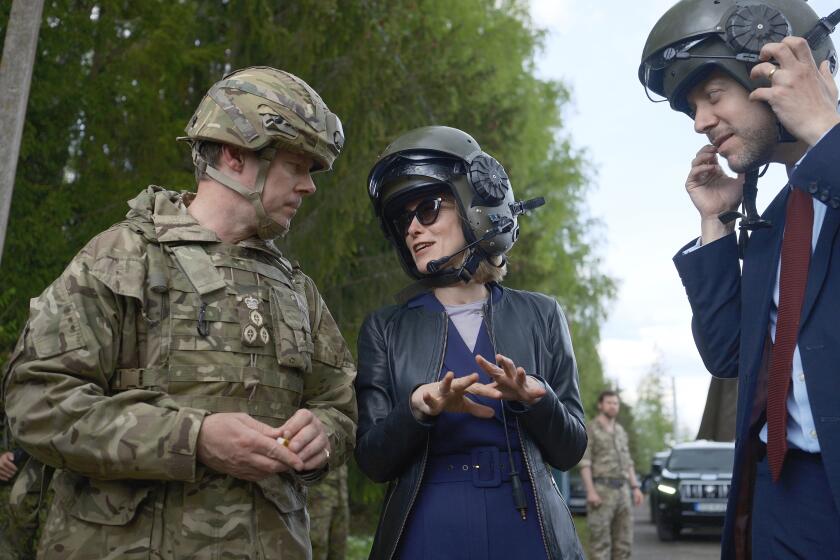The Nonstop Mom : Camille Geraldi understands rejection. That’s why she’s taken in 24 children with special needs.
Until recently, Camille Geraldi weighed more than 360 pounds. And there, beneath all that bulk, she says, lay the origins of her enormous matriarchal desire.
But now that she’s lost 225 pounds, it hasn’t diminished her ability to give, especially to her children.
Good thing.
Camille Geraldi has 26 kids. All but two--the only ones she gave birth to--are afflicted with Down’s syndrome and other severe medical problems. These 24 have been adopted or are being adopted.
“I know more about these children than anybody,” says Geraldi, 44, who frames her now-angular face with long, dark hair and speaks in a husky contralto. “Being obese for most of my life, I always had people making fun of me. I was ridiculed and rejected, the way these kids are. I think that’s why I was fat for much of my life: so that I would understand.
“Now, I have an instinct, a gift. And this is a lifetime commitment. These children will never reach the level of a normal child.”
There is nothing normal about Camille Geraldi’s children, husband Michael, a pediatrician, or Camille herself.
On this weekday she is standing in the kitchen of one of her three adjacent houses in Kendall, a suburb about 15 miles southwest of downtown Miami that was particularly hard hit by Hurricane Andrew. The school bus has just arrived, adding 16 children to the 10 or so here, and the house--gutted by wind and now rebuilt--vibrates to a pulse of what seems barely controlled pandemonium.
As always, Camille Geraldi is center stage, directing, cooing, touching, laughing, scolding and ever dominating a scene that at first might be mistaken for a runaway fire drill in a makeshift intensive-care ward. Most of the children here--and some of the adult staff--not only have Down’s, a genetic birth disorder that usually involves developmental and some physical complications, but other problems as well.
Yet terms such as Down’s syndrome and genetic birth disorder don’t begin to describe the Geraldis’ kids. Take a look: Camia, age 1 1/2, with only a partial brain, has had a tracheotomy. She and Michael, also 1 1/2, are hooked up to breathing monitors. Over here, 4-year-old Jo-Layne is fiddling with her colostomy bag and demanding a sandwich. Hydrocephalic Christopher, a 3-year-old who has just learned to stand up on his own, is in a playpen singing one line from “Happy Birthday.”
Ten-month-old Adam, anencephalic, blind and deaf, lies in a car seat, while next to him Derrick, 10, is slumped in his wheelchair. Stricken with meningitis as an infant, he remains in a vegetative state.
Seventeen of the 24 children the Geraldis have adopted or plan to adopt have Down’s. Most have had heart surgery; many are scheduled for more operations.
Outside on the grass, on blankets or in the arms of young volunteers, are more children, most under 8. Some have been gratefully entrusted to the Geraldis in guardianship arrangements by parents incapable of caring for them. Some are in state-supervised foster care. Others come for day care only.
On any given day, there are upward of 30 children here, most with their own bed, their own needs, their own profound problems. “Many people come here and they feel sorry for these children,” says Ruth Ann Kaner, who worked with the Geraldis for more than 10 years. “But they’re happy. Camille is strict but loving. She demands perfection, and everything must be clean and immaculate always. She is extremely organized.”
Her work has not gone unnoticed.
In the last two years, the Geraldis have been profiled on “60 Minutes” and “48 Hours,” and featured in People magazine and in dozens of local newspaper stories. In 1991, President George Bush proclaimed the couple his 609th “Daily Point of Light,” and Camille has received motherhood honors from several national groups.
As a result of the publicity, and her own lifelong passion to help severely impaired children, Camille Geraldi’s family has grown into a business centered around a nonprofit foundation with an annual budget that exceeds $300,000. The Up With Down Syndrome Foundation receives donations of about $150,000 a year. It gets about 200 letters a week and has a waiting list of some 500 families from all over the world that want the Geraldis to take their child, too.
Camille admits she can’t take them all. “I don’t want any more children,” she says. “This has become a big business, but I still think of myself as a mommy to each of them.”
After the birth of two healthy daughters, Renae, now 16, and Jaclyn, 15, the Geraldis began to adopt children that parents, and even doctors, had given up on. “Ever since we met, I knew Camille’s dream was to open a home for retarded children, and I knew we’d have a lot of kids,” says Michael. “But I thought maybe 12 would be a lot.”
The children Camille wants are those she calls “incompatible with life,” adding: “We only take the sickest of the sick. Most people are afraid of these children, afraid they will die. But I am not afraid. I know they are very fragile. I do get very attached, but I guess I know where to draw the line.”
When one of her children dies, she mourns and then goes on. But only two have passed away since she adopted her first Down’s child in 1986. Says Michael, 50: “She makes them thrive.”
For Camille, being a mommy has never been harder. In the last year alone, she has mourned the death of her father and has been traumatized by a hurricane that devastated the compound. It forced her, a staff of five and all of the children to move to another county for six months.
Camille also underwent a hysterectomy in May, 1992, and developed gangrene after a later surgery to remove excess skin resulting from her weight loss. In order to protect her children from infection, she says she daily wrapped her body in Saran Wrap.
She has also been stung by the sudden departure of two key staff members, including Kaner, and criticism that she has become difficult to work with since her dramatic transformation. She agrees that she is a perfectionist and can lose her temper. “It has been,” she says with a sigh, “the most stressful year of my life.”
Yet Camille--sleeping no more than two or three hours a night, cooking dinner for 40 five nights a week, making medical decisions for her children while maintaining a killer schedule of speechmaking and counseling parents of newborn Down’s syndrome children--carries on.
Why? How?
She tries to explain: “I love the challenge of getting them better. I can’t explain it. It’s a need I have.”
*
Camille Geraldi can’t remember when she wasn’t fat. Her parents, especially her father, a wealthy New York clothing manufacturer, nagged her about losing weight, but Camille says she was unmoved by appeals to either vanity or her well-being. Shunned by her peers, she found kinship twice a year with handicapped children, whom her father hosted at benefit picnics.
She met Michael 18 years ago at Miami Children’s Hospital, where she worked in the emergency room as a practical nurse and he was a resident, and they eventually married. Her eating problems persisted. As an adult, Geraldi believes she overate not to satisfy some longing, but simply because she enjoyed food and believed she was fated to be a large person.
She ate not wisely or well, but often: candy bars and cookies on the run during the busy days and then gorging at night on pasta and cakes, three pieces at a time. “I ate until I couldn’t eat any more,” she says.
Then one evening about two years ago, something magical happened. Awake in the middle of the night as usual, she was talking by telephone to a new employee on duty in the house next door. Always a stickler for background checks on those who worked with the children, Camille was alarmed, she says, to hear the man say he was an alcoholic, albeit in recovery.
Her immediate reaction was to tell him she would have to let him go. But in the long conversation that followed, Camille made a connection she had never made before.
“I realized that his addiction problems were mine,” she says. “When I heard him talk about the need for the next drink, I saw that was the way I thought about food. He talked about alcohol the way I thought, ‘When am I going to be able to get to McDonald’s?’ I hung up the phone and I was crying. And from that day to this I have been on a diet.”
With the help of Nutri-System, for which she has made national commercials, Camille went from tent-shaped dresses to a Size 10. When entering a restaurant (where she orders steamed vegetables, no oil), she no longer panics at the thought of negotiating a booth.
Camille, who stands 5 feet, 7 inches, describes herself as food addicted, even while sticking to a daily regimen of three meals and two snacks, all modest servings of healthy food. She now applies the same discipline to eating that she uses to run a household where the weekly trip to the grocery store costs $800, where the annual clothing allowance tops $10,000, and where almost every child is just a breath or two away from a medical emergency.
The cost of Camille Geraldi’s avocation on her husband and two birth daughters has also been great. Although the Up With Down Syndrome Foundation is now virtually self-supporting, and the family receives state money for nine of the children whose adoptions are not final, Michael Geraldi estimates that over the years he has spent about $800,000 of his own money to cover routine costs.
After school, Renae and Jaclyn join other staff and volunteers in caring for the children and preparing food. Although Camille and Michael get away together on many weekends, they have never had an extended family vacation.
In recent days, Camille has spent a lot of time in Miami Children’s Hospital. She’s come with Adele, a rambunctious 4-year-old with a polka-dot bow in her blond hair, an intravenous drip in her arm and a deep wheeze in her chest. After 25 days, and several exploratory surgeries, Adele’s ailment remains “undiagnosed respiratory distress.”
In Room 327, between phone calls, beeper messages and visits from the nurses, Camille strokes the hair of the girl in her lap and says: “If I thought about what I do in a normal day, I couldn’t do it. But this is why I’m doing this. If I’m with the children, nothing else is important. I can make a difference in their lives. And they always love you, no matter what.”
Love is a constant. Yet she knows there have been changes. “When I was heavy,” says Camille, “I think there was a tendency to overcompensate with personality, to be friendly.
“Now, I see that people want to be with me, and they are not embarrassed to be with me. Here in the hospital, for example, there are doctors who wouldn’t even acknowledge me before, but now they come up, say hello and hug and kiss me. That makes me sick.
“Maybe that’s why I chose Down syndrome,” she concludes. “No one could be more sensitive to the needs of these children than I am. If I had always been thin, I might not understand that. Maybe I wouldn’t know how to love the way I do.”
More to Read
Start your day right
Sign up for Essential California for news, features and recommendations from the L.A. Times and beyond in your inbox six days a week.
You may occasionally receive promotional content from the Los Angeles Times.






